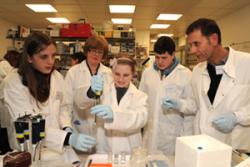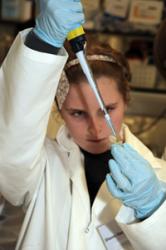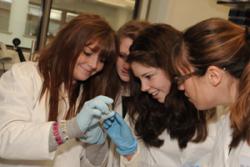Lab experiments for Ysgol Bodedern pupils participating in Antarctica, Climate Change and Icefish project
 Lefr-right, Harry Owen, Mrs Lyndell Williams, Head of Biology at Ysgol Bodedern; Dionn Hargreaves, Harry Williams and Professor Gary Carvalho contributing to their exciting lab work, part of their climate change project.Pupils from Ysgol Uwchradd Bodedern working on an innovative and exciting climate change project, visited Bangor University to work in the laboratories there as part of their project Antarctica, Climate Change and Icefish.
Lefr-right, Harry Owen, Mrs Lyndell Williams, Head of Biology at Ysgol Bodedern; Dionn Hargreaves, Harry Williams and Professor Gary Carvalho contributing to their exciting lab work, part of their climate change project.Pupils from Ysgol Uwchradd Bodedern working on an innovative and exciting climate change project, visited Bangor University to work in the laboratories there as part of their project Antarctica, Climate Change and Icefish.
Scientists from the University’s School of Biological Sciences have been leading the project under a Partnership Grant from The Royal Society, the UK’s national academy of science, and have been working with the pupils since September. The project is introducing pupils to the effects of climate change on marine animals in a part of the world where biodiversity and habitats are especially vulnerable to environmental change.
Year 10 pupils aged between fourteen and sixteen have taken up the challenge of formulating and testing hypotheses about climate change, and examining how a mix of biological and physical evidence of ocean conditions can be used to assess impacts on Antarctic icefish and the wider marine community.
 Dionn Hargreaves of Ysgol Bodedern engrossed in the work at Bangor University.On Tuesday December 11th, they tested some of the theories in Bangor University’s Molecular Ecology & Fisheries Genetics Laboratories, based in the Environment Centre Wales. With climate change, higher temperatures are expected to reduce the survival and distribution of fish larvae in marine waters because faster growth might result in starvation before young fish reach their nursery grounds. The pupils will use a “cutting-edge” type of genetic profiling, and advanced microscopy to age young fish and examine the likelihood and evidence for such effects under a range of possible temperatures.
Dionn Hargreaves of Ysgol Bodedern engrossed in the work at Bangor University.On Tuesday December 11th, they tested some of the theories in Bangor University’s Molecular Ecology & Fisheries Genetics Laboratories, based in the Environment Centre Wales. With climate change, higher temperatures are expected to reduce the survival and distribution of fish larvae in marine waters because faster growth might result in starvation before young fish reach their nursery grounds. The pupils will use a “cutting-edge” type of genetic profiling, and advanced microscopy to age young fish and examine the likelihood and evidence for such effects under a range of possible temperatures.
The visit followed demonstrations and laboratory work for pupils at Ysgol Bodedern. The pupils will also be involved in podcasts and a video link between Ysgol Bodedern and scientists based at the British Antarctic Survey’s King Edward Point Research Base, South Georgia, in late 2013.
On competing their own project, the Ysgol Bodedern pupils will use the techniques and knowledge they acquire from the University partnership to design a bridging exercise for Year 6 pupils from local primary schools (including Ysgol Gymuned Bryngwran,Ysgol Cylch Y Garn Llanrhyddlad, Ysgol y Ffridd Gwalchmai, Ysgol Gymuned Llannerchymedd, Ysgol Pencarnisiog, Ysgol Gynradd Bodedern, Ysgol Gynradd Llanfachraeth, Ysgol Ffrwd Win Llanfaethlu, Ysgol Gymraeg Morswyn Caergybi) in the summer term of 2013.
They will also give a presentation at the Bangor Science Festival (http://www.bangor.ac.uk/bangorsciencefestival/) in March 2013.
Professor Gary Carvalho, Professor of Molecular Ecology, and Dr Mark de Bruyn, a postdoctoral research scientist at Bangor University, have been working in partnership with the Head of Biology, Lyndell Williams at Ysgol Bodedern from September 2012 and will continue until the project completes in April 2014.
 Delighted at extracting DNA in the lab as part of their Antarctica, Climate Change and Icefish project are left-right: Sara Hughes, Megan Caplin and Paige Bentley of Ysgol Bodedern, and Marie-Claude Dupuis of the Royal Society.Professor Carvalho said: “Our project brings class-room learning to life and helps the school students to understand the impact of science on their day-to-day activities. Making these subjects relevant is how we demonstrate how vital they are to our lives.”
Delighted at extracting DNA in the lab as part of their Antarctica, Climate Change and Icefish project are left-right: Sara Hughes, Megan Caplin and Paige Bentley of Ysgol Bodedern, and Marie-Claude Dupuis of the Royal Society.Professor Carvalho said: “Our project brings class-room learning to life and helps the school students to understand the impact of science on their day-to-day activities. Making these subjects relevant is how we demonstrate how vital they are to our lives.”
Mrs. Annwen Morgan, the headteacher at Ysgol Uwchradd Bodedern, said: “As a school, we are very pleased with this project and look forward to working with Bangor University. The project offers our students the chance to meet and work with local scientists and allows them to build and develop their scientific understanding in a way that is exciting, original and relevant to their lives.”
Professor John Pethica FRS, Vice-President of the Royal Society, said: “We’re pleased to be supporting Antarctica, Climate Change and Icefish at Ysgol Uwchradd Bodedern. Science and engineering are exhilarating and dynamic subjects and we hope that by giving teachers the opportunity to introduce innovative science that we can help show young people how much fun in real-life these subjects can be, and inspire them to become the inventors, explorers and innovators of the future.”
Teachers, scientists, engineers and industry partners interested in applying for a Partnership Grant should visit www.royalsociety.org/education.
Publication date: 10 December 2012
